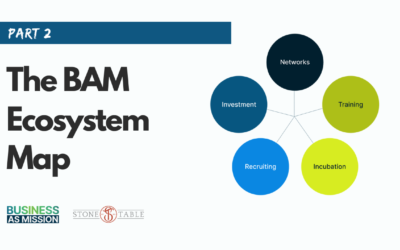BAM: The Power of We, Bottom Lines, and Expectations

How can Business as Mission, bring true Kingdom impact to the people around us? Well, a couple years ago, I spent 8 days in China with a group of pastors and businessmen. We spent a week exploring some powerful new BAM platforms taking root in the area. We plan to join together in raising BAM funds for their expansion later this year.
I was overwhelmed by the beautiful Kingdom work being accomplished through everyday business models in this part of the world. Still, one of the greatest joys of this past week was the rich relationships created and deepened between our group of 15 people. Relationships are one of the great joys of this life, but by pairing them with BAM consulting mission, it becomes a great way things get done for God’s Kingdom.
Our Vision
The Stone Table was started as a way to leverage business and to create BAM funds for missions work around the world, and we could have simply continued to do that on our own. But something supernatural seems to happen when God’s people choose to come together in humble submission to Him and to one another. God’s work is meant to be undertaken together.
Unity glorifies God. It’s a sign to this world that the His Kingdom is a different sort of place. It’s governed by a different set of rules and a different kind of bottom line that manic power grabs really can give way to mutual submission and love.
Working Together
We were made to walk together and work together. It’s the way we were designed, but our flesh doesn’t embrace that on its own. Thank God Jesus does the healing work inside of us we could never do for ourselves. The Gospel ends our isolation from God and one another.
Who is God calling you to walk alongside? Whether it’s within BAM Consulting or not, what could you do with others that you simply cannot accomplish on your own?
Mutual submission. Mutual love. Mutual service. Mutual sacrifice. The Kingdom is we.
BAM Consulting: Two Bottom Lines
This is a story of a Business as Mission (BAM) practitioner on the field using business as a mechanism for planting the church in areas of the world you can’t go with traditional missionary methods. In order to protect the work being done there, we will not share the names of the workers or the specific locations.
When I began our BAM consulting trip, I had no prior warning that I was starting a business that would do over $20,000 in sales and employ over 40 people in its first year. I simply wanted to start a project that would help us better engage the community, but I quickly realized that I actually had a real business on my hands!
Overnight, I began scrambling to educate myself on how to run a business, or more specifically, a BAM-style business. I searched for books, podcasts, or classes to teach me what I needed to know since I had very little prior business training. I also started to watch Shark Tank a lot!
Many of these resources helped me figure out how to think with a business mind, which is needed and good. They helped me start off well and grasp much of what I didn’t know. One thing became quite clear: all of these business resources were geared toward one bottom line: making money. After all, that’s what business is for, right?
Yes and no. I am adamant that we have two bottom lines: Profit and People.
How can I run a business with two bottom lines? It does get complicated at times. Another BAM owner once told me, “I’m willing to have the most inefficiently run business in the world if that means I’ve created lots of jobs for people.” That struck me.
Part of running a BAM Business (a big part, I would contend) is creating jobs and connecting with people. That’s the “soul mission.” If we only care about one bottom line, profit, we miss this in the big picture.
Do we want our BAM actions to be profitable? YES! Should it be profitable? YES! But not at the expense of the people it serves and engages. That’s the difference between a BAM and other business philosophies. We see the souls of people as part of our ultimate bottom line. We define success based on how well our BAM is opening doors to reach people.
It is easy to get distracted and use all of our efforts to create an efficient business structure that makes a good profit. Still, the real work is creating a business model that builds good relationships with those we can connect with through our projects. We have two bottom lines.
BAM: When Anticipation Doesn’t Match Expectation
This is another story of a Business as Mission (BAM) practitioner on the field using business as a mechanism for planting the church in areas of the world where you can’t do that with traditional missionary methods. In order to protect the work being done, we will not be sharing their names or specific locations for their protection.
We love when we get the opportunity to sit down with BAM missionaries to learn and grow from their experiences on the field. Here is an honest and open dialogue from one of them about anticipation and expectations and what it’s like when things don’t work out as they’ve planned.
Anticipation plays a significant role in adjusting to new cultures and work. But just as the anticipations of a coming Messiah were clouded by false expectations, causing many to reject Jesus, we can also leave a people and culture if our preparedness creates false expectations.
Moving to a new land, and more importantly, a new culture riddles us with anticipation of what is to come. But, if we aren’t careful, it can build unrealistic expectations, at the same time, wearing ourselves out preparing for what we think is ahead.
Anticipation vs. Expectations
Expectations are dangerous. Over preparation can be risky. When we expect too much, we will surely be let down. In our western minds, we call it ‘planning’ or being ‘proactive.’ But is that really the goal?
I’ve learned that planning and preparing kill joyful anticipation. We think we know what it’s going to be like because of the information we’ve gleaned from YouTube videos and books about foreign cultures. We even visit ethnic restaurants in the states to sample foods prevalent in our new country. But let’s consider this simple scenario:
The chicken curry you sampled in the states may have been delicious, making you excited to savor this dish again in your new country. But once you’re served, it doesn’t look anything like the chicken curry you had back home. There are bones in the chicken, and it’s greasy and spicy. This is not the westernized version of what your taste buds remember.
If you didn’t sample any of the cuisines in the states, you would have no idea what to expect. The bones and spices would not take you by surprise. You just dig in without anticipating anything different than what’s before you.
Conclusion
Using this very basic example, we see that preparation didn’t really pay off. It merely created unrealistic expectations. It made adjustment more difficult. When we anticipate without expectations, we increase our joy and reduce our stress!
Think about this example in the context of business as mission! I want to shift away from expectations, over-preparation, and pro-activeness because those things reveal a desire to control. May I instead rest and trust the God who rules overall. When we put our full weight on God, knowing He cares about every detail, we will live life joyfully with heartfelt anticipation.


